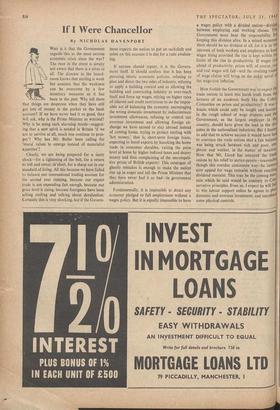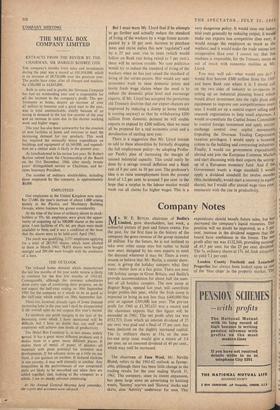If I Were Chancellor
By NICHOLAS DAVENPORT
Clearly, we are being prepared for a nasty shock—for a tightening of the belt, for a return to toil and sweat, in short, for a sharp cut in our standard of living. All this because we have failed to balance our international trading account for the second year running, because our export trade is not expanding fast enough, because our price level is rising, because foreigners have been selling sterling and talking about devaluation. Certainly this is very shocking, but if the Govern-
ment expects the nation to put on sackcloth and ashes on this account it is due for a rude awaken- ing.
If anyone should repent, it is the Govern- ment itself. It should confess that it has been pursuing idiotic economic policies, refusing to plan and direct the two sides of industry, refusing to apply a building control and so allowing the building and contracting industry to over-reach itself and force up wages, relying on higher rates of interest and credit restrictions to do the impos- sible act of balancing the economy, encouraging the wrong domestic investment by indiscriminate investment allowances, refusing to control our overseas investment and allowing foreign ex- change we have earned to stay abroad instead of coming home, trying to protect sterling with 'hot money,' that is, short-term foreign loans, expecting to boost exports by knocking the home trade in consumer durables, raising the price level at home by higher indirect taxes and dearer money and then complaining of the uncompeti- tive prices of British exports! This catalogue of ghastly mistakes is enough to make the nation rise up in anger and tell the Prime Minister that they have never had it so bad—in government administration.
Fundamentally, it is impossible to direct any economy pledged to full employment without a wages policy. But it is equally impossible to have
a wages policy with a divided nation—divided between employing and working classes. The Government must bear the responsibility for keeping this division alive. In a mixed econoirq there should be no division at all, for it is in the interests of both workers and employers to keeP wages rising provided the rise is kept within the limits of the rise in productivity. If wages ri4 ahead of productivity, prices will, of course,.ris and real wages will fa1l--4nd the resulting roun of wage claims will bring on the sickly spiral o the wage-cost inflation.
How foolish the Government was to expect th trade unions to learn this harsh truth from th lectures of an academic body like the Cohe Committee on prices and productivity! It was lesson which could only be taught and learne in the rough school of wage disputes and t13 Government, as the largest employer in th country, should have given the lead in the dis putes in the nationalised industries. But 1 haste to add that to achieve success it would have ha to convince the trade unions that a fair balanc was being struck between rich and poor, ern ployer and worker, in the matter of taxation Now that Mr. Lloyd has annoyed' the trad unions by his relief to surtax-payers—reasonahl though this overdue concession was—he cano° now appeal for wage restraint without exactio dividend restraint. This may be the coming mea sure which he said would be contrary to CO' servative principles. Even so, I expect he will fat to win labour support unless he agrees to Pia domestic and overseas investment, and introduc some physical controls. But I must warn Mr. Lloyd that if he attempts to go further and actually reduce the standard of living of the workers by a wage freeze accom- panied by a 10 per cent. increase in purchase taxes and excise duties (his new 'regulator') and by a 25 per cent. rise in rents (which would follow on Bank rate being raised to 7 per cent.), there will be serious trouble. No sane politician would try to reduce the standard of living of the workers when he has just raised the standard of living of the surtax-payers. Nor would any sane economist want to raise domestic prices and invite fresh wage claims when the need is to reduce the domestic price level and encourage exports. If Mr. Lloyd has accepted the pernicious old Treasury doctrine that our export chances are improved by inducing a slump at home (which is coming anyway) or that by withdrawing £200 million from domestic demand he will enable exports to expand by £200 million, then we must all be prepared for a real economic crisis and a devaluation of sterling next year.
There is a suggestion that Mr. Lloyd intends to add to these absurdities by formally dropping the full employment policy—by adopting Profes- sor Paish's plan of increasing the margin of unused industrial capacity. This could easily be done by a savage overall deflation and a Bank rate of 8 per cent. to 10 per cent. The professor's idea is to raise unemployment from the present level of 1.2 per cent. to around 3 per cent. in the hope that a surplus in the labour market would wash out all claims for higher wages. This is a very dangerous policy. It would raise our indus-u trial costs generally by reducing output; it would make our exports less competitive than ever; it would enrage the employers as much as the workers; and it would make the trade unions less co-operative than ever. 1 cannot say that this madness is impossible, for the Treasury seems as out of touch with economic realities as Mr. Lloyd.
You may well ask—what would you do? I would first borrow £300 million from the II■1 and leave Bank rate where it is. I would call on the two sides of industry to co-operate hi setting up an industrial planning board which would direct investment into the right plant and equipment to improve our competitiveness over- seas. I would set up a central export selling and research organisation to help small exporters. would re-constitute the Capital Issues Committee to control foreign investment and apply stricter exchange control over capital movements (repealing the Overseas Trading Corporation taxation privileges). I would apply a licensing system to the building and contracting industries. Finally, I would cut government expenditures abroad and join the European Common Market and start discussing with their experts the setting up of a European monetary fund. And if the Government wants a wage standstill I would apply a dividend standstill for twelve months (this, incidentally, would start a recovery in equhY shares), but I would offer annual wage rises com- mensurate with the rise in productivity.



















































 Previous page
Previous page